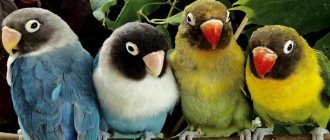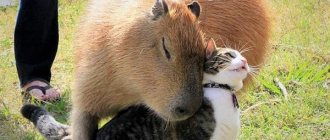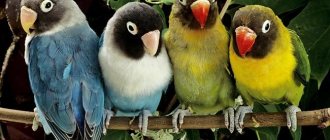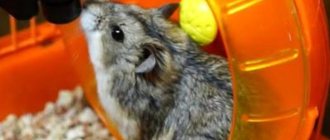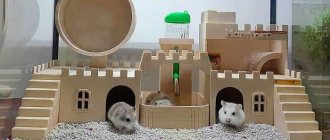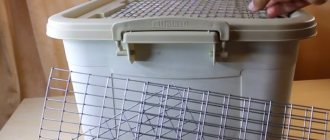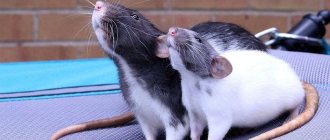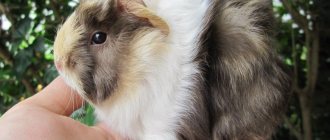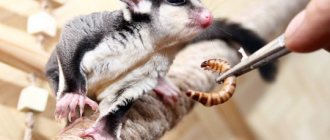Every day, more and more often, people choose not the usual pets (such as a dog, cat or hamster), but unusual and rarer animals. For example, they get a ferret as a pet. But are wild creatures capable of living harmoniously with people?
Many owners of these animals believe that this is possible. Some have never regretted such an unconventional choice of a pet. Is it worth having a predatory baby in the house who comes from a wild forest? Let’s determine all the advantages and disadvantages of the decision made.
Description and characteristics of the animal
The ferret belongs to the mustelid family and belongs to the forest, steppe and American species of predators. Man has tamed forest and steppe species of animals. I learned everything about keeping and breeding ferrets. And now domestic animals are also called ferrets.
Appearance
The ferret has an elongated body and thick fur. The size of a ferret depends on the species. On average, the body length is no more than 50 cm, weight is from 0.3 to 2 kg, and the tail is 20 cm long.
The animal has strong paws and a long neck. This structure helps him penetrate the most inaccessible places and engage in petty theft.
Character and habits
A ferret can behave differently. The character of the animal emerges by 4 months. At this time, he has already learned to follow all the rules and follow your commands. And now the time has come to show your personality:
- temperament depends on his gender. Females are smarter than males, but males are more reserved. The female can rarely be picked up, but the male can even fall asleep on the owner’s lap;
- resembles a human in character. While he is small, he is very restless; becomes extremely impudent as a teenager; an adult pet gains wisdom and behaves more measuredly;
- This animal retains fun and mischief throughout its life;
- Ferrets are quite stubborn animals. If he needed something, he couldn't stop it. And also how you can’t discourage him from digging the soil in your flower pots. But you can organize a separate nook for him for this;
- inquisitiveness or curiosity is another characteristic of the ferret. It can be a serious problem because it is not always possible to keep track of this entire process;
- The ferret does not feel danger in anything at all. His fearlessness leads him to the highest cabinets or into a container of water. He can fight with a larger animal. With all this, the consequences can be disastrous for him.
And yet, the main quality of the home ferret remains his cheerful and unusual disposition. Therefore, you will never be bored with him.
How long do ferrets live?
At home, ferrets live from 8 to 10 years. Although there are also long-lived individuals, living up to 15 years. The lifespan of a domestic ferret directly depends on the conditions of detention and heredity.
If you want your pet to live with you for a long time, provide it with proper care and pay more attention.
Habitat
Despite the variety, they are all found throughout the Eurasian continent, North America, and also in northwest Africa. The steppe ferret prefers to live in open areas, and it is almost impossible to find it in crowded places, in forests, in the mountains, etc., but this animal is found in the steppes or semi-deserts of Mongolia, Kazakhstan, China, as well as in some regions of Asia and Europe.
Interesting fact! The fourth variety, bred artificially, cannot be found in the natural environment, since the animal has a fairly peaceful character. In addition, the ferret lacks hunting skills, which does not allow the animal to survive in the wild.
Black ferrets prefer to settle in forests, ravines, near bodies of water, as well as in populated areas, close to people. At the same time, they do not try to go far into the thicket, sticking to open forests, as well as the edges of the forest. The main habitat of the black ferret extends to Europe and part of Africa. The black-footed variety of ferrets prefers forested areas, as well as the prairies of North America, for their livelihoods. At the same time, the black-footed ferret can easily be found in the mountains, at an altitude of more than a thousand meters above sea level.
Relationships with other pets
If you have other pets in the house, it is better not to show them to each other right away. A decorative ferret must first become familiar with its habitat and get used to the conditions. The best way to communicate is with the same animal. They will quickly become friends and spend a lot of time together.
With dogs
The interaction between ferrets and dogs depends on the breed of the latter. Large breeds of dogs are more popular with small animals; they are associated with tender feelings and strong friendship.
Small breeds of dogs cause irritation in them due to the similarity in character. Ferrets hurt small dogs. Hunting breeds, on the contrary, can offend a small neighbor if they see him as prey.
The most successful condition for the emergence of friendly relations between a dog and a ferret is if you brought a small animal to an adult dog; or both childhood pets.
With cats
Ferrets and cats can develop a wonderful relationship, or they may not pay attention to each other. But there will be no enmity between them if the owner loves them equally.
Cats are used to being loved, so they should not see the owner's warmer attitude towards the ferret.
With birds, rodents, reptiles
You should always remember that a ferret is a predator. Birds, rodents, fish, lizards are prey for him. Therefore, they should be kept in a remote place.
What to feed your ferret at home?
Wildlife supplies such predators with tasty small rodents, reptiles and birds, as well as large insects. Organizing such a diet at home for a pet is problematic. So it is best to use ready-made food or a mixture of meat products, the composition of which is specially designed for ferrets. Natural products can also be given, but it is not a fact that your pet will eat them. These animals are strictly prohibited from eating sweet and spicy foods. Don't forget to provide fresh and clean water for your ferret.
A meager or incorrectly selected diet has a bad effect on the health of the individual; the animal can get sick or even die.
Choice of animal
As pets, ferrets are very unusual. Therefore, you need to approach the choice of a pet responsibly, paying attention to any little details:
- You should buy it from a nursery to be sure of its good heredity and that you were not sold a wild specimen. Take contact information from the breeder so you can contact him after purchasing the pet.
- The age at the time of purchase must be no younger than 1.5 and no older than 4.5 months. In determining the age, you will have to rely on the honesty of the breeder.
- Health is the main selection criterion. The eyes, nose, and fur should be clean, movements should be smooth, and the ferret itself should not be aggressive. By the way, if an animal gets scared and behaves viciously, this may be a sign that it is wild and not domestic.
Hygiene procedures
To keep your pet clean, you need to have a special pruning shears (to trim nails), a thick comb for combing, a shallow bath, and several towels. The bedding in the ferret's home is changed weekly.
Table 2. Hygiene procedures for ferrets
| Procedure name | How often to perform | Execution nuances |
| Bathing | Once every 2–3 weeks | Chemicals or shampoos should not be used. The filling depth of the bath should be small. |
| Nail trimming | 1 time every 2 months | If a ferret owner does not know how to trim his own nails, he should consult a veterinarian. |
| Combing | Once every 2–3 days | The ferret grooming comb should be washed after each procedure. |
Buying a ferret. Practical advice
Before deciding to buy an animal, you need to pay attention to 6 factors:
- Puppy price. A pet ferret doesn't come cheap. If you do not want to face various problems in the future, then be prepared to buy a pet at an appropriate price.
- Maternal nutrition. The health of her puppies depends on what the female ate. The food must be special and of good quality. Puppies should receive vitamins.
- Parents' health. It is important that both the female and the male are tested for infections before mating. This will be confirmed by the certificates that the breeder will show you.
- Place where the female and puppies are kept. They should not live in a cage - puppies need space to develop properly. It is good if they are kept in an enclosure.
- Swimming. Puppies should be taught to swim from a young age. This will avoid weak muscles, weak bones and the development of rickets.
- Pet documents. The puppy must have a certificate, a veterinary passport indicating the vaccination performed, and a pedigree.
Natural enemies
Many of their natural enemies live in the same territory as ferrets, such as:
- Foxes and wolves that are capable of hunting ferrets, especially in winter, when they do not particularly have to choose victims for food.
- Birds of prey, in the form of night owls and golden eagles.
- Wild cats, for whom catching a ferret is not a problem at all.
- Large snakes, although they are not always able to cope with such a mobile animal.
An equally dangerous enemy of the ferret is humans, who cause serious harm to the population of these useful animals, not only exterminating them, but also surviving from their natural habitats.
Interesting fact! To protect itself from natural enemies, the ferret emits an unpleasant odor, which is generated by special glands located at the base of the tail.
As a result of human economic activity, populations of small animals that are part of the diet of these predators are declining, which threatens the existence of ferrets no less than other problems.
Keeping a pet
Keeping a ferret in the house requires careful attention. He is unlike other pets, which means he needs special conditions.
Where to keep the animal: in a cage or in an apartment
Keeping a ferret in an apartment is possible if there is an enclosure. If you put an animal in a cage, then be prepared to let it out into the wild for several hours a day.
If this is not possible, then it is better to equip the enclosure with everything necessary. Moreover, you can put the enclosure both in the apartment and on the loggia, if you are sure that there are no drafts there.
Arrangement of the cage
The ferret's house should be equipped with a feeder, water bowl and tray. A sleeping place can be made from an ordinary box by laying soft fabric there.
It's good if your pet has several floors with different transitions between them.
What to feed your ferret at home
The ferret's body does not need a variety of nutrition. You need to immediately decide what type of food you will use:
- natural food - imitation of the natural habitat. These are food mice, cockroaches and worms. For home maintenance, this method is not entirely acceptable;
- natural or regular food. The ferret is fed turkey, chicken, beef, cartilage, low-fat sea fish, offal, fruits, berries, vegetables, vitamin complexes, and sometimes porridge;
- ready-made balanced special food of good quality. Such mixtures already contain everything that a ferret needs for health and well-being. This method of feeding makes caring for the animal much easier. It is better not to add any other products, otherwise the predator may refuse the ready-made mixtures completely;
- It will be useful for babies to be given different cereals with a small addition of cow's milk. They will also love minced chicken and turkey. This diet will be useful for animals up to one month old.
What not to feed ferrets:
- bread, buns, pies and other bakery products;
- sweets, sugar, marmalade and so on. It is necessary to completely exclude sweets from the animals’ diet, otherwise it will have a detrimental effect on health;
- It is also advisable to exclude nuts, seeds, beans and legumes from the diet, just as sweets have a bad effect on the animal’s well-being;
- vegetable proteins (soybeans, etc.), vegetables with coarse fiber (carrots, turnips and other roots), whole grains, potatoes, mushrooms, garlic, onions and citrus fruits;
- We also remove smoked meats from the animals’ menu, although they will beg for it if they smell it. Therefore, it is better to refuse such products yourself;
- Fatty or fried foods must be removed and hidden. If such food is prepared at home, then you need to monitor it and not leave it unattended;
- Dairy products should be abandoned as the animal may have problems with the gastrointestinal tract. And a trip to the veterinarian is guaranteed for fun games. Therefore, it is not recommended to keep this product in a tetrapack or in film and unattended;
- You should not experiment with ready-made food for cats and dogs. The diet of these animals varies greatly. And therefore, if you want to have a cheerful and playful animal at home instead of a lethargic and forever sleeping animal, then give up this idea.
Since domestic carnivores have an accelerated metabolism, they need to be fed more often, about 4–6 times a day. You need to watch the portions and give not a large amount, otherwise overeating is guaranteed.
Approximate dietary requirements:
| Diet | Daily value per individual in grams | |||||
| Winter | Summer | Spring/Autumn | ||||
| females | males | females | males | females | males | |
| Beef | 10 | 20 | 10 | 20 | 20 | 40 |
| Offal | 40 | 60 | 40 | 60 | 60 | 90 |
| Bird | 35 | 45 | 30 | 45 | 30 | 45 |
| Cartilage | 20 | 30 | 20 | 30 | 25 | 40 |
| Fish | 40 | 60 | 40 | 60 | 40 | 60 |
| Porridge | 10 | 20 | 16 | 20 | 35 | 45 |
| Poultry fat | 10 | 15 | 10 | 15 | 5 | 8 |
| Vegetable fat | 5 | 5 | 5 | 5 | 5 | 5 |
| Fruits vegetables | 5 | 8 | 5 | 8 | 5 | 8 |
| Raw yeast | 2 | 2 | 2 | 2 | 2 | 2 |
| Vitamins | 1 | 1 | 1 | 1 | 1 | 1 |
Toilet arrangement
You can buy a cat litter tray with a bottom tray and a top mesh. You need to purchase a filler that neutralizes the odor. The special triangular tray is not very convenient to use, as it is smaller in size.
Pros and cons of ferrets as pets. Criterias of choice
The ferret is a playful and inquisitive animal
Before you get a predatory or exotic pet at home, you should understand what difficulties and joys it will bring to a measured life. So, among the positive aspects of keeping a ferret in an apartment, the following aspects can be highlighted:
- the animals are active and sociable, with due attention from the owner they will be attached to him;
- Ferrets are very playful;
- are small in size;
- ferrets do not make loud sounds;
- these pets sleep almost all day, so when you leave for work, you will not feel guilty for leaving your pet alone;
- You can walk your ferret outside by wearing a special leash;
- pets quickly get used to their cage;
- the fur of these animals is hypoallergenic.
The disadvantages of keeping a ferret come down to the following aspects:
- ferrets, like cats, mark territory, so there will be a specific smell in the apartment;
- the need for castration/sterilization;
- ferrets have perinatal glands, the secretion of which has an unpleasant odor, but, fortunately, it quickly disappears;
- ferrets constantly dig for something, bite and can damage furniture, wires, clothes, and various objects;
- Ferrets require specific nutrition, which has strict requirements;
- Such nimble and active animals have a habit of hiding everything that is in bad shape.
Choosing a puppy is a responsible task, since each ferret has its own temperament and it is important that it suits your needs. In addition, you need to take into account the following features:
1. Before purchasing, you need to decide on the gender of the animal. According to this criterion, pets vary in size, as well as behavioral characteristics. Males are larger, more imposing and aggressive. Parenting may be difficult. But females are distinguished by their flexible character and independence.
Important! A ferret of any gender must be sterilized after purchase. In the absence of a partner, these animals become depressed and quickly die.
2. The acceptable age for purchasing a puppy is 1 month. But experts do not recommend taking the cub away from its mother early, since she imparts certain survival skills to it. The optimal age for purchase is 2-3 months, since it is during this period that ferrets quickly get used to being handled and are easy to train.
3. You should also pay attention to the appearance of the puppy. A healthy ferret will have good fur (soft, clean, no bald spots), be slightly well-fed and cheerful. Vibrices should be elastic, not brittle. The nose of a healthy individual is wet and cold, and the eyes are clean. Any discharge from the mucous membranes should alert you.
How to care for a ferret
Caring for a ferret is easy. But there are several rules of care:
- Clean the cage once every two days. If you have more than one animal, then once a day. Wipe all cage equipment once a week with a baking soda solution.
- Provide a stable bowl for food and drink so he can't knock it over.
- Give your pet a lot of attention, do exercises with him so that he doesn’t get bored.
- Periodically take your pet to the veterinarian to prevent the development of various diseases.
Features of the walk
You already understand how to care for a ferret at home. Now a few words about walking outside. You can often walk with the animal, but there are conditions:
- the animal must be vaccinated. The virus can also be picked up in a clean summer cottage. And recovery will be difficult, sometimes futile;
- Any season is suitable for a walk. You just need to choose the weather. In rain, wind, strong heat, snowfall, severe frost, it is better to be at home;
- the ideal time of day is morning or evening, when there is no direct sunlight;
- protect your pet from ticks. Treat it with special means. After a walk, be sure to check it carefully;
- Before the onset of the cold season, the ferret's fur coat must be renewed. If this does not happen, then he will be very cold outside;
- be sure to use a harness. The animal can quickly disappear from sight. And it will be easier to keep him from unwanted encounters with other animals;
- Monitor your pet closely. Something unexpected can always happen and the animal will be in danger.
Hygiene procedures
Care and hygiene of ferrets is a prerequisite for keeping them at home. The pet must always be clean. Therefore, you need to bathe him, but do it carefully so that the animal does not bite you. His nails need to be trimmed once every three weeks, otherwise he will have difficulty walking.
Features of bathing
There are many rules in caring for domestic ferrets, but all of them are aimed at not harming the animal.
The bath must be filled so that the animal is comfortable and can easily stand on its paws. Some ferrets also like to swim, so you can fill the bath a little more.
Do not use shampoos or other chemicals. There are specialized products for washing ferrets, or you can try baby shampoo. This point should be discussed with a veterinary specialist at the first visit. Otherwise, the animal may get irritated on the skin.
When you bathe your pet:
- do not turn on the water tap at this time, he may get scared;
- Be careful not to get water into your eyes or ears;
- Do not use products to wash the face, wash with plain water;
- do not turn the animal over on its back;
- use special detergents;
- Dry your pet well after bathing with a dry soft cloth and comb the fur.
It is very important to bathe the animal correctly the first time, so that in the future he will not be afraid of this procedure.
How to clean ears and trim nails
When caring for a ferret at home, it is necessary to carry out hygiene procedures on time.
Ears are cleaned no more than once a month. Earwax should not bother the animal and be light brown in color.
For cleansing, a special lotion is used, which is instilled into the ear. After this, the animal must be released so that it shakes its head and then the lotion, along with excess wax, will come out of the ears.
Nails need to be trimmed 1-2 times a month. To do this, you will need a special nail clipper and another person to help secure the animal.
If you can’t do it yourself, then it’s better to contact a veterinarian.
If during the procedure you accidentally injure it, dip the damaged area in a solution with peroxide and wait until the bleeding stops.
After such procedures, be sure to praise your pet and treat him to something tasty so that next time he will not be afraid.
Possible diseases: how dangerous they are and how to treat them
Ferrets are susceptible to various diseases, so when keeping this animal, you should know the main warning signs in order to seek veterinary help in time. So, ferrets can suffer from the following ailments:
- Rabies is an acute viral disease that causes severe damage to the nervous system. The pathogen is transmitted through saliva from an infected animal. There is no cure for this disease, so pre-vaccination is necessary.
- Plague of carnivores. This disease is very serious and can be fatal. The source of infection is sick animals. Sometimes the virus can be carried by people (on shoes, clothes), birds, rodents, etc. It enters the ferret's body through the respiratory tract or digestive tract. Main symptoms: elevated body temperature, rhinitis, conjunctivitis, redness of the chin and lips, lack of appetite. The disease has no cure. The animal dies within a few days.
- Aleutian mink disease. This is also a viral disease that damages the immune system. The virus is transmitted from a sick animal through saliva, feces, urine or respiratory organs. Symptoms depend on which organ is affected. Usually there is bleeding from the nose, mouth, increased thirst, diarrhea, apathy, fever, anemia. Since the symptoms are similar to a number of other diseases, it is not always possible to establish an accurate diagnosis. There is no cure for this disease.
- Flu. Ferrets can easily become infected with this virus from humans. Symptoms are as follows: watery eyes, rhinitis, cough, fever, diarrhea, apathy, increased drowsiness. Typically, the ferret will recover on its own within 3-14 days. If this does not happen, contact your veterinarian.
- Eosinophilic gastroenteritis. This disease affects the gastrointestinal tract. It often develops due to feeding foods high in plant elements. Symptoms are as follows: diarrhea, formation of skin ulcers, severe weight loss. For treatment you need to see a doctor.
- Stomach ulcer. This disease often develops due to poor diet and stress. An advanced form of the ulcer leads to severe gastric bleeding and death of the ferret. Therefore, you should not hesitate. Take your pet to see a doctor immediately.
- Otodectosis is the appearance of ear mites that parasitize the ear canal. Infection occurs from a sick animal through objects in contact with it. The symptoms are as follows: itching, formation of black spots inside the ear, inflammation. Treatment is carried out with drugs for cats and dogs.
- Fleas. The skin of a ferret can be parasitized by cat, dog and human fleas. Symptoms are as follows: itching, nit formation, local inflammatory reactions. Treatment is carried out with a special zoo shampoo or flea aerosol.
Upbringing
As a pet, a ferret must know and understand some rules of behavior. And the owner needs to be patient in raising the pet so that it does not cause unpleasant troubles.
First of all, he must get used to the owner and this takes time. Therefore, you should not purchase adult animals - they have already had experience of communication, and it is unknown how they will behave with you.
Start hand-feeding your new pet while talking to him and telling him his name. The animal will quickly get used to you and your voice.
How to toilet train
A ferret at home goes to the toilet in a litter tray, which must first be placed in the cage, and then can be moved into the room:
- if you adopted an animal from a breeder, it is already toilet trained and will quickly get used to a similar tray and filler;
- if this is not the case, then you will need to carefully monitor the new pet and put it in the tray at the right time;
- If an animal shits in the wrong place, it can be punished by putting it in a cage. Treat this area with a special anti-odor agent.
How to play with a ferret
Ferrets are very playful animals from early childhood until old age:
- when playing with its owner, the animal can bite him quite hard. Therefore, it is better to protect your hands with leather gloves;
- You can play with him the same way as with a cat: by wrapping your arms around him, as if you are fighting him, or by tying the toy to a thin rope and moving it;
- if you buy or build a tunnel for an animal, it will happily run away from you through it while playing;
- hide something tasty in a maze or somewhere in the house, and the ferret will look for it. This is a great game that trains the animal;
- A bright plastic toy and a tennis ball will suit your pet well. He won't be able to bite through them. And the games will be fun.
Play is part of raising a pet. You need to devote a lot of time to this. This is very important to him.
How to stop biting
You must immediately show your displeasure if your pet ferret bites you, even if he did it while playing:
- scream and move away from your pet;
- clap your hands loudly and say “no”;
- move away from him and stop playing.
The ferret must understand that he was punished. You can put him in a cage. The main thing is to do these actions every time he bites you. Only in this way will the ferret understand what exactly he is doing wrong. But when he stops biting, you need to thank him with a tasty morsel.
How to train at home
A ferret can be trained at home, but it will take some time.
Firstly, this should not be done during play, otherwise the animal will not understand that this is training.
Secondly, you can use different methods: rewarding with treats, imitating other animals.
Thirdly, you cannot ask several commands at once - let him learn one first, then the other. Commands should be short, and alternate difficult commands with easy ones.
Walk
Walking with your pet is possible and necessary. On the one hand, this is not at all necessary, but on the other hand, a lot of positivity and good mood are guaranteed for both you and your four-legged friend. Domestic ferrets are inquisitive and sociable animals. Your pet will be happy to explore the area during a walk and will happily communicate with its brothers if they meet them.
When going out into nature with a fret, it is worth remembering some points:
- the pet must be fully accustomed to the harness;
- you should not let go of your ferret, no matter how tame it may be (instincts can take over, and you will never see your pet again);
- Before the walk, make sure that the animal has received routine vaccinations;
- choose suitable weather and place for walking.
It is necessary to accustom the animal to a harness in advance, despite the fact that animals get used to the new “clothes” quickly and do not experience the slightest discomfort in the future, in the first stages you will have to be quite persistent. The animal will try to get rid of excess by all available means. It is recommended to put on the harness for a few minutes, encouraging the pet, and “walk” around the apartment, gradually increasing the time.
Regarding suitable weather, we can say the following. Rain, dampness, and slush are definitely not suitable. Not only is there minimal pleasure from such a walk, but the ferret can get sick due to hypothermia - the fur on her belly sticks together and practically does not protect her from cold and moisture.
But is it possible to walk a ferret in winter? Of course you can! The ferret's winter coat perfectly protects it from the cold. However, there must be a reasonable measure in everything; you should not allow a four-legged animal to dig in the snow for more than an hour. In addition, as in the case of a harness, walks in the cold should begin gradually, from 5-10 minutes.
Health
A healthy ferret is always very active and actively plays with you. If this is not the case, it means he has some health problems. Proper care, a balanced diet and timely vaccinations will protect your pet from many diseases.
Possible diseases
If your pet doesn't want to play, it means he's sick:
Helminthiases . An animal infected with helminths does not grow or develop. If your pet is weak, has diarrhea or constipation, eczema and seizures, dull fur and a large belly, then he most likely has worms.
Such animals can easily become infected with infectious diseases due to reduced immunity. To avoid the appearance of helminths, the pet must be kept clean and monitored for nutrition, and given anthelmintic drugs once every six months.
Ectoparasites . The ferret must be protected from fleas, lice, ticks and lice. They greatly disturb the animal and are carriers of dangerous diseases.
Therefore, before a walk, it must be treated with special means that protect against these parasites.
If your pet still has them, you must immediately get rid of them step by step with the help of effective drugs from the pet store.
Aplastic anemia is a disease of both males and females. Characterized by prolonged estrus. A large amount of hormones is produced and anemia occurs. The animal loses its appetite and becomes lethargic.
Treatment is carried out only by a veterinarian. To avoid disease, you need to sterilize your ferret.
Animal vaccination
Even if you have given your pet all the necessary vaccinations, you should not think that now he will not get sick. It all depends on the condition of the animal and the quality of the vaccines administered:
- Rabies . Your ferret should be vaccinated against rabies every year. This disease is very dangerous for the central nervous system of the animal. It is necessary to seek help from a veterinarian as soon as possible.
- Plague of carnivores . The disease affects the mucous membranes of open and internal organs. It can be cured, but only in the early stages, so you need to contact a veterinary clinic as soon as possible.
- Contagious hepatitis, leptospirosis and parvovirus enteritis are also very dangerous diseases against which your pet ferret must be vaccinated.
After each vaccination, the ferret needs to be quarantined. At this time, he must be carefully monitored so as not to miss possible complications.
Ferret castration. Is this really necessary?
If you are not going to start breeding domestic ferrets, then they need to be neutered. So that in the future your pet does not suffer from hormonal imbalance.
Both sexes have their reproductive organs surgically removed. This must be done before the onset of the rut in males and the appearance of estrus in females, at approximately the age of 6 months.
Animal vaccination
Ferrets must be vaccinated. Experienced veterinarians use imported anti-plague chemical compounds for this purpose. It is undesirable to use domestic medicines.
All vaccinations performed are recorded in the animal’s veterinary passport. Treatment of ferrets for worms should also be carried out regularly and noted in documents.
Important! If your pet ferret is not vaccinated against rabies and canine distemper, it may die.
Taming wild ferrets
You can take a wild predator into your home if you have carefully studied its habits and prepared for its maintenance. First, you need to catch a wild animal. At the same time, make sure that your traps are safe.
It will be difficult to tame him. But if you catch a couple of individuals, it will be easier for their offspring to grow in your home. The caught ferret must be placed in a separate corner where he will feel safe.
If you disturb him and intimidate him, he will have a heart attack. Over time, you need to ensure that the animal eats in front of you. Be patient, because taming a wild ferret will be very slow.
What do they eat in nature?
Ferrets are predators, so when living in the wild, they eat what they catch. These are mice, frogs, birds, etc.
Natural enemies
A ferret is a small animal. Therefore, in nature he has many enemies. Wolves, foxes, large snakes, owls, and golden eagles often threaten to eat the ferret. He can escape from them due to his agility and quick reaction.
What do they eat in nature?
Since the ferret is a predator, its diet consists of food items of animal origin. Therefore, his diet includes:
- Insects and invertebrates. When an animal is hungry, it will never refuse worms and other small animals.
- Reptiles, in the form of lizards and snakes, including poisonous ones.
- Rodents, as well as small animals such as rabbits and hares.
- Birds, however, a ferret will never pass by a bird's nest without checking it for eggs or chicks.
The ferret does not eat fish or fruit at all, since its digestive system is not adapted for plant components. The animal receives all the necessary nutrients from its basic diet.
Interesting to know! Ferrets, like many other animals, store food for the winter. To do this, predators store the food they have caught in a secluded place.
The ferret hunts mainly at night, although under certain conditions, when there is a lack of food, it can hunt during the day. If food is very tight, then the ferret can easily eat carrion.
Breeding
Domestic ferrets, depending on whether they are female or male, are ready to breed at the age of 9-11 and 6-8 months. If you decide to breed them, you need to know that:
- their puppies are born premature;
- females have false pregnancies;
- In order for the babies to be born strong, the female must be fed properly.
Breeding ferrets are suitable for breeding. Individuals must be vaccinated. The female moves into a separate cage before giving birth. She can have up to 10 puppies. The female feeds the babies for up to 4 months. If further breeding is not planned, then the individuals are sterilized.
What kind of food should you have?
If you decide to keep a ferret in your apartment, then be sure to consider the feeding habits of this animal. This is one of the important conditions for the healthy existence of this animal. The well-being of the pet, as well as its vitality and energy, will depend on a properly formulated diet.
The following foods must be present in a ferret's diet:
Dry feed mixtures. Balanced feed is required to fill the animal’s body with vitality. They can be purchased at any specialty store; Raw food
You should be especially careful with this food. Choose your meat carefully
It is better to buy it from a trusted seller, this will help avoid infecting the animal with parasites; Minced meat porridge.
If you have not yet lived with a ferret in an apartment, and you have never had this animal, then you should start feeding with dry mixtures. Even cat food is suitable for them. You should first study the composition and description of the feed mixture. You can also use reviews that are available in large quantities on the Internet.
The ferret eats in small portions, but often. He should eat up to 7 times a day. It is imperative to monitor its nutrition, and also do not forget to add water to the drinking bowl.
Short description
One of the forms of the forest ferret is adapted for home keeping. A domesticated pet is called a ferret. This is a small, squat creature with an elongated flexible body and a beautiful long tail. The fur of ferrets is thick and soft, it is very pleasant to the touch. Unlike wild relatives, which can only be dark brown in color, domestic animals have a richer palette of fur: from white to black.
Ferrets naturally have brown fur.
Reproduction and sterilization
The animals become sexually mature at 6 months. Both the male and the female must be sterilized a little in advance or already during the onset of estrus or rutting.
Female ferrets do not come out of estrus on their own; they die if fertilization does not occur. An unsterilized male becomes aggressive, stops contacting people, may start biting again, marks his territory, and begins to smell horribly. The smell of an uncastrated ferret is very strong and pungent; it permeates the entire apartment.
Sterilization should only be performed by a veterinarian who has previously performed such surgery on a ferret. Not all doctors have encountered these animals. If your veterinarian says that a ferret is a rodent, or that the operation is no different from castration of a cat, run away from him. Don't let doctors learn or experiment on your animal.
Simultaneously with sterilization, the ferrets' paranal glands are removed. These are the glands through which skunks release their pungent odor. The ferret has the same ability, the smell is not so strong, but it is still better to remove them.
